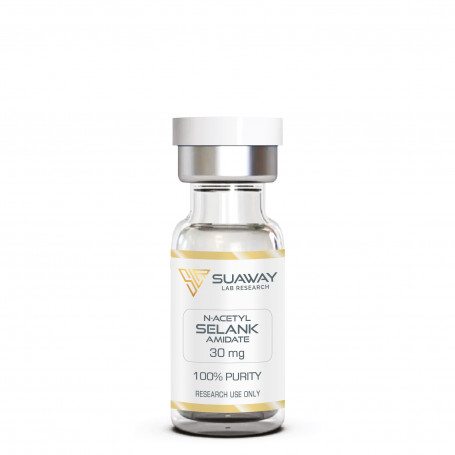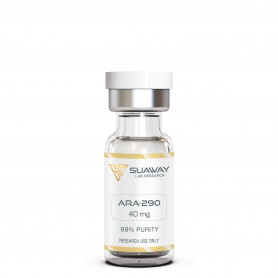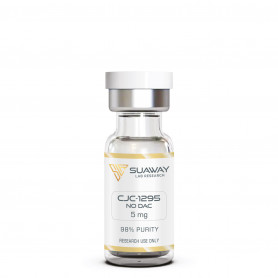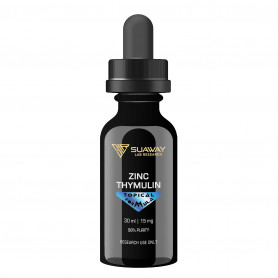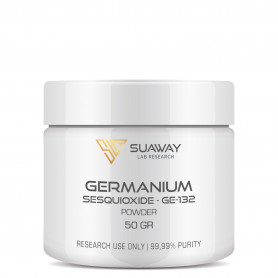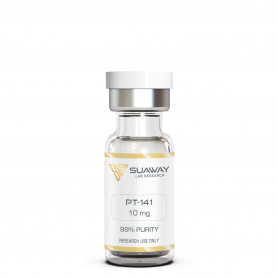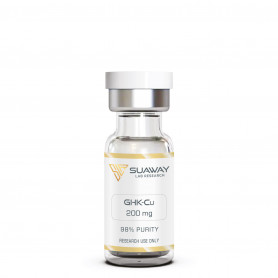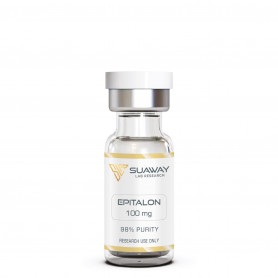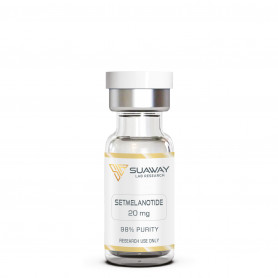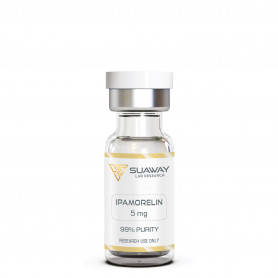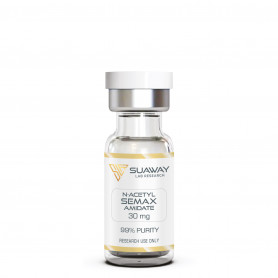N-ACETYL SELANK AMIDATE - 30 mg
The simplest way to think about N-Acetyl Selank Amidate is as an improved form of Selank. According to studies, N-Acetyl Selank Amidate enhances every feature of Selank by boosting its potency, half-life, absorbability, and ease of blood-brain barrier crossing. Selank has been shown in animal experiments to protect the central nervous system from illness and trauma, decrease anxiety, increase learning and memory, and change the blood clotting process. These characteristics assist to enhance the benefits of Selank. Selank and other glyprolines provide insight into how DNA expression patterns may be changed by a single peptide to have profound consequences, while more study is still needed in this area.
Description
STRUCTURE
Sequence: Ac-Thr-Lys-Pro-Arg-Pro-Gly-Pro-NH2
Molecular Formula: C35H60N12O9
Molecular Weight: 792.93 g/mol
CAS Number: 129954-34-3
Peptide Purity: Greater than 98%
Other details: No TFA Salt, No Mannitol
Storage: Lyophilized peptide must be stored at -20°C and peptide solution at 4°C.
N-Acetyl Selank Amidate has low oral and excellent subcutaneous bioavailability.
N-Acetyl Selank Amidate is more effective than other standard Semax medicines, according to extensive study.
DESCRIPTION
Along with the other nootropic medication Semax, Selank was created at the Institute of Molecular Genetics (Russian Academy of Sciences) in collaboration with the V.V. Zakusov Research Institute of Pharmacology (Russian Academy of Medical Sciences). Generalized anxiety disorder (GAD) therapy and nootropic usage of selank have been licensed in Russia.
The immunomodulatory peptide Tuftsin is analogous to the synthetic compound selank. Selank and Tuftsin both can elevate serotonin levels while lowering anxiety.
Selank, a member of the anxiolytic and nootropic drug class, has been proven to increase memory, learning capacity, and cognitive function as well as considerably reduce anxiety and sadness. It also has antidepressant effects and might be effective in treating generalized anxiety disorder (GAD). Selank provides a benefit over conventional anxiety medications like benzodiazepines since it does not have any sedative or detrimental cognitive side effects, as well as no related addiction or withdrawal issues.
Selank closely resembles many of the tuftsin-like actions that may be employed in pharmacology to reduce the negative effects of anxiety and stress enhance brain and cognitive functioning, or boost the immune system. For instance, Selank stimulates serotonin metabolism, affects monoamine neurotransmitter concentration, controls Interleukin-6 (IL-6) expression, and modifies the equilibrium of T helper cell cytokines. Previous clinical trials or Selank studies have shown that this peptide has no bad side effects and no danger of addiction, in contrast to the majority of prescription medications, which have several unfavorable side effects.
A monoamine neurotransmitter, serotonin is also known as 5-hydroxytryptamine (5-HT). Though its true biological role is complicated and varied, affecting cognition, reward, learning, memory, and several physiological processes including vomiting and vasoconstriction, it has a widespread perception as a contributor to emotions of well-being and pleasure.
Selank may decrease the gene that produces the inflammatory cytokine IL-6, according to research on depressed people. It is interesting to note that this effect only occurs in depressed patients and does not seem to affect healthy people. Selank may help treat individuals with anxiety-asthenic disorders, which are severe conditions in which anxiety is linked to exhaustion, headache, heart palpitations, high blood pressure, nerve pain, or depression.
Selank has comparable effects on lowering anxiety when compared to benzodiazepines and other common anxiolytic medications, however only Selank has any impact on asthenic symptoms including exhaustion and discomfort.
Selank's ability to regulate IL-6 expression and the peptide's capacity to change the pace at which the body's natural painkillers, enkephalins, and breakdown are both probable contributing factors to the effect.
There has long been a link between anxiety and memory and learning. The relationship between anxiety and memory recall and the capacity to retain new knowledge is a negative one. Both Selank and conventional anxiety medications may lessen this effect, but Selank seems to do more than just lessen the negative effects of worry on cognitive performance. There is solid evidence that Selank directly enhances cognition.
Selank may even be able to restore memory and learning after brain injury, according to some research. In at least one investigation, rats were given a neurotoxic followed by Selank showing recovered cognitive functions. This result seems to be connected to Selank's artificial suppression of the brain's catecholamine pathway.
Selank may give some insight on how cognitive function may be recovered after traumatic brain damage, especially the forms of impairment that happen during childbirth, or at the very least enhanced.
In human clinical trials, Selank significantly boosted the production of brain neurotrophic factor (BDNF) in the rat hippocampus. BDNF is a protein that works on specific neurons in the peripheral and central nervous systems, promoting the creation or differentiation of new neurons and synapses while assisting in the survival of preexisting neurons. Long-term memory is facilitated by BDNF.
The Selank peptide has not yet been the subject of any noteworthy side effects, unwanted consequences, or harmful effects in scientific investigations or clinical trials.
The Benefits of N-Acetyl Selank Amidate:
- Reduces emotional tension, anxiety, dread, and melancholy significantly
- Enhances memory (memorization, information processing and organizing, and playing back memories)
- Increases focus and attention, and lessens mental tiredness
- May enhance learning capacity
- May enhance higher-order cortical brain activities (speech, thinking, coordination of movements)
- Keeps the body in healthy mental and physical health
- May improve immune system health
- Could be useful for alcohol withdrawal
- Increases monoamine neurotransmitter concentration and serotonin metabolism
- The expression of brain neurotrophic factor (BDNF) has grown quickly.
- Changes the balance of T helper cell cytokines and modifies the expression of Interleukin-6 (IL-6).
- Stimulates interferon release (anti-viral molecules)
N-acetylation is used in synthetic chemistry to change a protein's charge, hydrophobicity, and size. This may affect the protein's stability, localization, and binding preferences. N-acetylation is often done to increase a protein's half-life without compromising the protein's overall function. It is a cheap and well-known approach for enhancing peptide potency since it is a reasonably straightforward procedure.
Another small peptide alteration is amide, which is applied to the carboxyl group on the opposite amino acid chain. Amidation, like N-acetylation, is a natural process that affects as many as 50% of all peptides. Peptides' half-lives in the blood-stream are prolonged by amination, which also reduces their sensitivity to proteolytic breakdown. Peptides that have been amidated are less sensitive to pH fluctuations and may attach to receptors more readily. Amidated proteins' effects last longer than those of their non-amidated counterparts due to their tighter binding to their target receptors.
Amidation serves several purposes in synthetic biology. First, amidation aids in shielding peptides taken orally from hostile conditions in the stomach and GI tract. The majority of synthetic peptides are amidated to increase their efficacy after absorption, which is the second reason. Amidated proteins not only remain in circulation for a longer time, but they also bind to their target receptors more firmly and result in improved signaling. This latter point is crucial for peptides like Selank that function in the central nervous system. And last, amidation increases the quantity of Selank that crosses the BBB by increasing lipid solubility. Thus, amidated Selank is not only more effective as a result of improved receptor binding but also more of it reaches the receptors in the central nervous system.
REFERENCES
A. Volkova et al., "Selank Administration Affects the Expression of Some Genes Involved in GABAergic Neurotransmission" [PMC]
I.I. Kolovskii et al., "The optimizing action of the synthetic peptide Selank on a conditioned active avoidance reflex in rats" [PubMed]
A. Kasian et al., "Peptide Selank Enhances the Effect of Diazepam in Reducing Anxiety in Unpredictable Chronic Mild Stress Conditions in Rats" [Behavioural Neurology]
A.A. Zozulya et al., "The inhibitory effect of Selank on enkephalin-degrading enzymes as a possible mechanism of its anxiolytic activity" [PubMed]
O.N. Uchakina et al., "Immunomodulatory effects of selank in patients with anxiety-asthenic disorders" [PubMed]
A.A. Zozulia et al., "Efficacy and possible mechanisms of action of a new peptide anxiolytic selank in the therapy of generalized anxiety disorders and neurasthenia" [PubMed]
T.P. Semenova et al., "Experimental optimization of learning and memory processes by selank" [PubMed]
T.P. Semenova et al., "Effect of selank on cognitive processes after damage inflicted to the cerebral catecholamine system during early ontogeny" [PubMed]
DISCLAIMER
This product is intendend for lab research and development use only. These studies are performed outside of the body. This product is not medicines or drugs and has not been approved by the FDA or EMA to prevent, treat or cure any medical condition, ailment or disease. Bodily introduction of any kind into humans or animals is strictly forbidden by law.
This product should only be handled by licensed, qualified professionals

